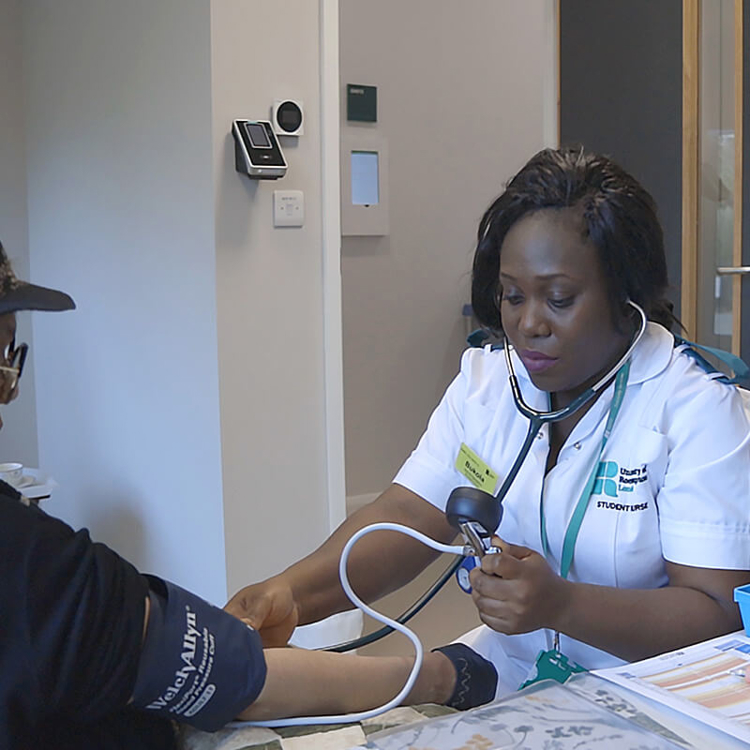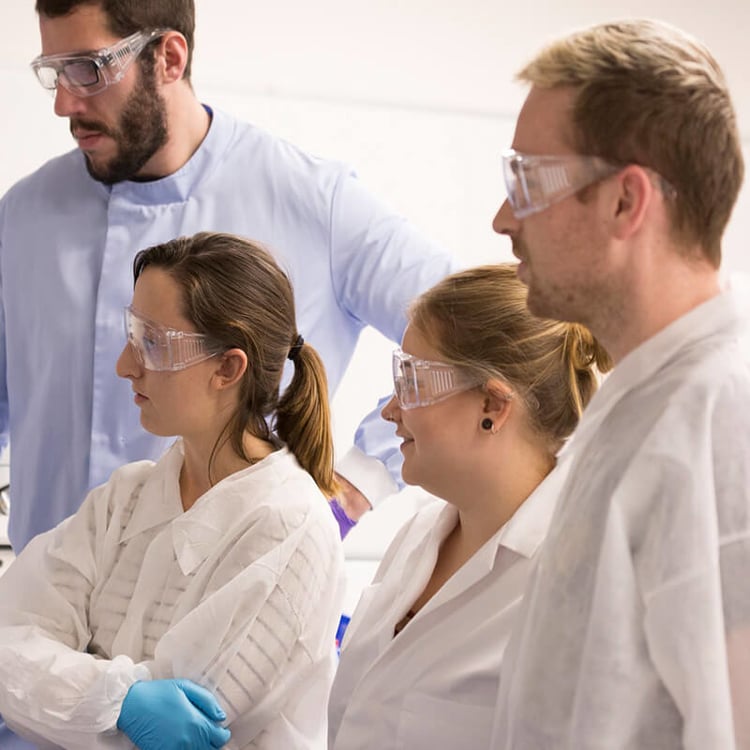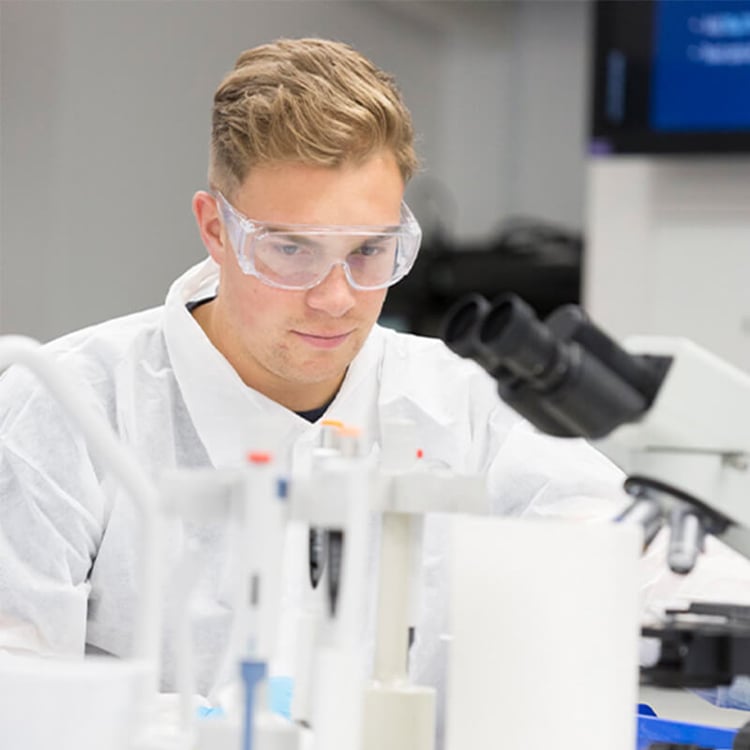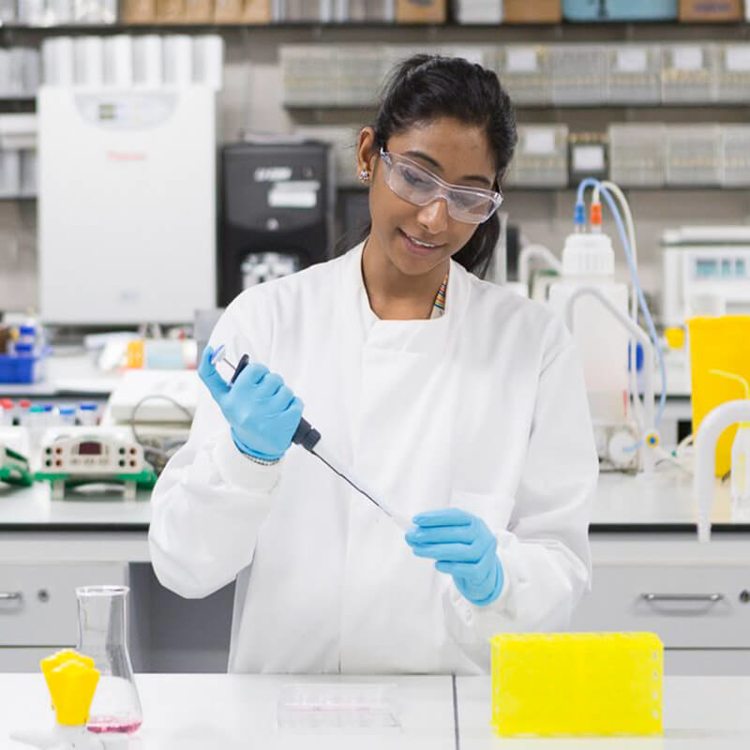Entry tariff:
112–128 UCAS points (or equivalent)
UCAS Code:
B743
Start date(s):
September 2026
If you are passionate about supporting the physical and mental wellbeing of others, our MSci Adult and Mental Health Nursing degree will equip you with the skills, knowledge and professional confidence to make a real difference.
Ranked in the top 10 in the UK by the Guardian University Guide 2024, this programme develops a holistic approach to caring for people across adult and mental health services.
Working alongside a dedicated team of experienced clinicians and academics, you will gain expertise in:
- Adult and mental health nursing practice
- Understanding the human body and supporting physical wellbeing
- Helping people maintain health and manage long-term or acute conditions
- Research, critical evaluation and advanced nursing analysis

Did you know?
On successful completion, you will be eligible to apply for registration as an Adult and Mental Health Nurse with the NMC, ready to start a rewarding career across both adult and mental health nursing.
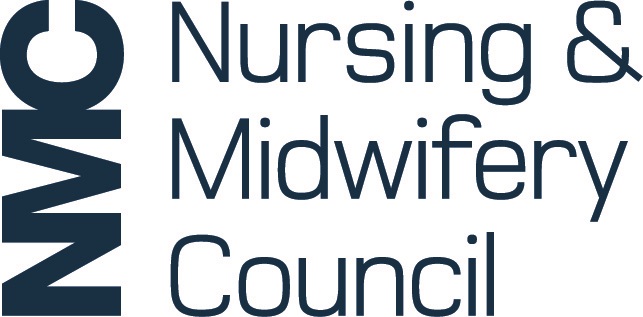
Our course ensures you graduate with a professional skillset that meets Nursing and Midwifery Council standards.
This includes:
- Physical and mental health assessment
- Risk assessment and management
- Holistic care planning and evidence based practice
- Clinical skills, psychological interventions and medication management
- Communication, teamwork, leadership and motivational interviewing
Throughout your training, you will develop the values of the NHS Constitution, including compassion, dignity and respect, and gain the confidence to work with people from diverse backgrounds.
What is an MSci?
An MSci is an integrated master’s degree that combines undergraduate and postgraduate study into a single programme, typically over four years.
It offers a deeper level of academic and professional training than a standard bachelor’s degree, giving you advanced knowledge, enhanced research skills, and greater clinical expertise.
For Adult and Mental Health Nursing, an MSci allows you to explore complex health issues, develop leadership and advanced practice skills, and undertake extended research projects.
Graduates are well-prepared for specialist roles, advanced practice, or further study at postgraduate level, giving you a strong foundation for a rewarding and flexible career in nursing.
2nd in the UK for student satisfaction in Nursing
(Complete University Guide 2025)

Silver in the 2023 Teaching Excellence Framework (TEF)
For delivering high quality teaching, learning and outcomes for our students.

Top 10 in the UK for Nursing
(Guardian University Guide 2024)

Module details: In this module, you will establish the foundations needed to begin your journey as an Adult and Mental Health Nurse while transitioning into Higher Education. You will develop academic skills such as writing, literature searching, referencing, and digital literacy, enabling confident use of technologies including generative AI. Core nursing theory, assessment tools, the nursing process, and person-centred care will underpin your growth as a safe, reflective, and accountable professional. Through case studies, reflective exercises, seminars, workshops, and asynchronous digital learning, you will build critical thinking, compassion, and integrity, preparing you for success in your studies and future nursing practice.
The aim of this interprofessional module is to introduce you to the key concepts and core foundations for the scientific study of life. A strong interprofessional ethos is built by bringing you and other students together and creating the opportunity to interact with and learn alongside students from a breadth of professional programmes. Subsequent modules will build on and integrate the strong foundations gained through this module to support the development of required profession specific knowledge and skills. You will develop a solid understanding of the structure and function of living organisms through the study of anatomy and physiological systems relevant to your programme of study. You will explore core physiological principles across the lifespan and, where appropriate, examine deviations from normal function, including aspects of pathophysiology.
Module details: In this module, you will explore the principles that underpin public health, health promotion, and illness prevention, focusing on how nurses help improve population wellbeing. You will examine social determinants, sustainable approaches to care, and the use of evidence and digital tools to enhance safety and quality. Learning activities will include lectures, seminars, discussions, case studies, and community focused tasks that deepen your understanding of health inequalities and prevention strategies. Through a written assignment centred on a health promotion campaign, you will apply theory to practice and build the knowledge and confidence needed to contribute to equitable, effective care in diverse settings.
Module details: In this module, you will begin developing core nursing capabilities through an integrated blend of placement learning and simulation. You will work with service users and professionals in diverse settings while holding supernumerary status so you can focus on your development. Preparation through online study, workshops, and skills sessions builds confidence for practice. You will take part in immersive simulations, virtual reality activities, and collaborative exercises informed by service users. Guided reflection supports your understanding of the NMC Code and current standards. Key themes include communication, safety, assessment, teamwork, dignity, and planning care, with all practice hours contributing to registration requirements.
These are the current planned modules on this course and may be subject to change.
Please note that these modules are subject to validation by the Nursing and Midwifery Council (NMC).
Module details: In this module, you will develop the skills needed to recognise and manage acute deterioration in adults across both physical and mental health contexts. You will apply your understanding of anatomy, physiology, pathophysiology, and pharmacology to structured A to E assessment and safe clinical decision making. Key emergencies, including airway and breathing problems, circulatory issues, stroke, diabetic crises, and acute mental health decline, will be explored alongside evidence based interventions. Through lectures, workshops, and simulation, you will strengthen communication, assessment, and escalation skills. A practical OSCE will assess your ability to respond to an unwell adult and propose appropriate next steps in care.
Module details: In this module, you will deepen your understanding of long term conditions within a rapidly evolving health landscape shaped by new national strategies. You will explore how biopsychosocial factors influence recovery and how evidence based pharmacological and non pharmacological approaches support effective management. Learning will focus on partnership working with the MDT, individuals, and carers to promote independence, healthy choices, and self management. Through workshops, seminars, online study, and interactive activities, you will examine common conditions and co morbidities and consider lived experiences. A case study assessment will consolidate your knowledge and prepare you for future nursing practice.
Module details: In this module, you will strengthen your research abilities through interprofessional learning that brings together students from a range of health and social care programmes. You will build confidence in appraising quantitative, qualitative, and mixed methods evidence, while exploring research design, ethics, and data analysis in relation to person centred care. Guided activities will develop your literature searching and synthesis skills, preparing you to plan a future scoping review. You will also examine digital healthcare and the ethical use of AI in research. The knowledge and scholarly thinking gained will support your wider academic work and future professional development.
Module details: In this module, you will advance the practice foundations established earlier by applying core nursing skills to more complex scenarios in both placement and simulation settings. You will prepare through online study, workshops, and clinical skills sessions that develop assessment, diagnostics, medicines management, and care planning. Learning will include immersive and virtual simulations, as well as Forum Theatre informed by service users and carers. Revisiting earlier case studies with added complexity, you will explore human factors, delegation, de escalation, mental health assessment, end of life care, recognising deterioration, and emergency response, strengthening confidence and competence across the NMC proficiencies.
These are the current planned modules on this course and may be subject to change.
Please note that these modules are subject to validation by the Nursing and Midwifery Council (NMC).
Module details: In this module, you will deepen your understanding of long term conditions within a rapidly evolving health landscape shaped by new national strategies. You will explore how biopsychosocial factors influence recovery and how evidence based pharmacological and non pharmacological approaches support effective management. Learning will focus on partnership working with the MDT, individuals, and carers to promote independence, healthy choices, and self management. Through workshops, seminars, online study, and interactive activities, you will examine common conditions and co morbidities and consider lived experiences. A case study assessment will consolidate your knowledge and prepare you for future nursing practice.
Module details: In this module, you will develop the skills needed to recognise and manage acute deterioration in adults across both physical and mental health contexts. You will apply your understanding of anatomy, physiology, pathophysiology, and pharmacology to structured A to E assessment and safe clinical decision making. Key emergencies, including airway and breathing problems, circulatory issues, stroke, diabetic crises, and acute mental health decline, will be explored alongside evidence based interventions. Through lectures, workshops, and simulation, you will strengthen communication, assessment, and escalation skills. A practical OSCE will assess your ability to respond to an unwell adult and propose appropriate next steps in care.
Module details: In this module, you will develop the knowledge and skills to provide integrated, person-centred care for adults and mental health patients with complex needs in secondary and tertiary settings. You will learn to coordinate care across providers and sectors, collaborate with multidisciplinary teams, involve service users, and navigate legal and policy frameworks. Through real-world scenarios and simulations, you will explore community-focused and digital models of care, apply principles of complex care, and strengthen clinical reasoning and ethical decision-making. The module prepares you to lead, advocate, and deliver safe, inclusive, and coordinated care in line with NMC standards.
Module details: In this module, you will further develop your skills and knowledge in mental health nursing as part of the dual registration MSci Nursing programme. You will build confidence in clinical practice through placements and simulated learning that cover all seven NMC platforms and the two skills annexes. Preparation includes clinical skills sessions with increasing complexity, covering assessment, history taking, diagnostics, care procedures, leadership, and medicines management. Simulation activities, including immersive and virtual reality experiences and Forum Theatre with service users, consolidate previous learning while exploring themes such as speaking up, difficult conversations, feedback, patient safety, duty of candour, human factors, and leadership in care.
These are the current planned modules on this course and may be subject to change.
Please note that these modules are subject to validation by the Nursing and Midwifery Council (NMC).
Module details: In this module, you will collect data for three research projects, designed to develop your skills and broaden your knowledge. With lecturer-led guidance, you will engage in data collection and analysis, enhancing your research capabilities. You will select one project to present as both a scientific paper and a poster, strengthening your ability to communicate research findings effectively. This module will equip you with essential research skills, preparing you for evidence-based practice and scientific dissemination in nutrition and health.
Module details: In this module, you will strengthen your readiness to move from student to registered nurse by deepening your understanding of accountability, legal requirements, and ethical practice. You will develop confidence in leading and coordinating care, managing patient groups, and using safe prioritisation and delegation strategies. Learning in class will complement your experiences in practice as you build your supervision and feedback skills and refine your approach to leadership within interprofessional teams. You will also prepare for your first post through focused career development activities. Your progress will be demonstrated through a professional portfolio that evidences reflection, growth, and clinical insight.
Module details: In this module, you will consolidate your learning in both adult and mental health nursing as part of the dual registration MSci Nursing programme. Through placements and simulated practice, you will integrate knowledge, skills, and professional values across all seven NMC platforms and the two skills annexes. Preparation includes clinical skills sessions and simulations that develop confidence to practise independently under indirect supervision, covering assessment, history taking, diagnostics, care procedures, leadership, and medicines management. Simulation modalities, including immersive and virtual reality experiences and Forum Theatre with service users, will consolidate previous learning and support readiness for professional practice and NMC registration.
These are the current planned modules on this course and may be subject to change.
Please note that these modules are subject to validation by the Nursing and Midwifery Council (NMC).
Careers
Make a meaningful impact on people’s lives and help shape the future of healthcare.
Our MSci Adult and Mental Health Nursing degree equips you with the advanced skills, knowledge and professional confidence to succeed in a wide range of roles across physical and mental health care.
Graduates go on to work in settings such as:
- Community nursing teams, including District Nurse, Health Visitor and School Nurse
- Community mental health teams
- Inpatient mental health services
- General Practice Nursing
- Care homes
- Hospices and rehabilitation centres
- Hospitals, including wards, A&E, ITU, outpatients and theatres
- Prisons and custody units
- Specialist teams, such as Respiratory, Oncology and Tissue Viability
- Research
- Education
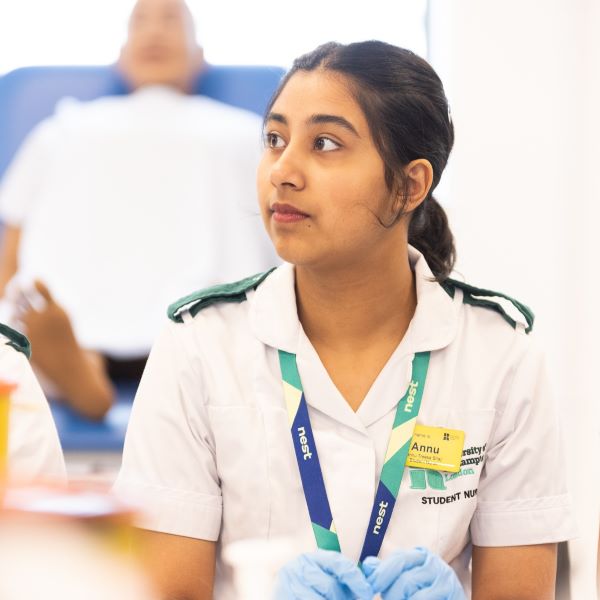
The Student Futures team is here to support you throughout your time at Roehampton and beyond.
They offer services tailored to your needs, helping you take confident steps towards your future.
You’ll have access to a wide range of career workshops and events, where you can engage with employers and develop the skills you need to succeed in the workplace.
These opportunities will help you build your CV, prepare for interviews, and connect with successful Roehampton graduates who are thriving in their careers. You’ll also be able to engage with our partners across London and beyond.
Wherever you want to go in the future, you'll be preparing for the world of work from your very first day.
Learning & assessment
How you'll learn
Our MSci Adult and Mental Health Nursing degree combines classroom learning with hands-on practice in our Clinical Simulation Centres, helping you gain the confidence to apply your skills safely in real clinical settings.
Teaching is led by experienced academics and practising professionals and includes lectures, seminars, group work, online learning and reflective practical exercises.
You will study alongside healthcare professionals from other disciplines, developing a broad understanding of modern nursing, including its role in 21st century health services, integrated community care, evidence based practice, and building professional relationships.
In our Clinical Simulation Centres, you will practise skills safely with other students, service users, carers, role players and high-tech patient simulators. These skills will then be refined through placements across a wide variety of settings, including community nursing and mental health teams, inpatient services, primary care and public health nursing, care homes, hospices and rehabilitation centres, and acute hospitals.
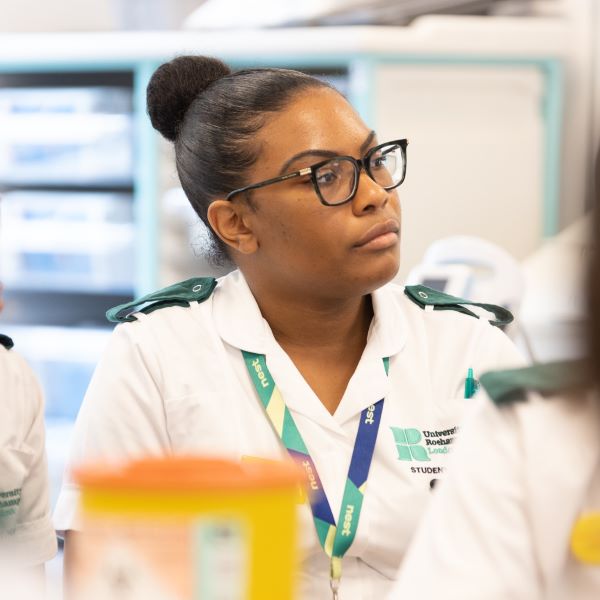
How you'll be assessed
You will develop your clinical expertise and academic knowledge through a combination of practice-based and academic assessments, designed to prepare you for advanced roles in nursing. These include:
- Reflective and case study based assignments
- Exams
- Presentations
- Practical’s to apply theory in real-world contexts
Your clinical skills will be assessed through simulation-based activities in our Clinical Simulation Centres, allowing you to practise safely and receive detailed feedback.
During placements, both clinical and academic staff will evaluate your performance and professional development. In your fourth year, an independent research project will further assess your analytical and research capabilities, ensuring you graduate ready for advanced practice or leadership roles.
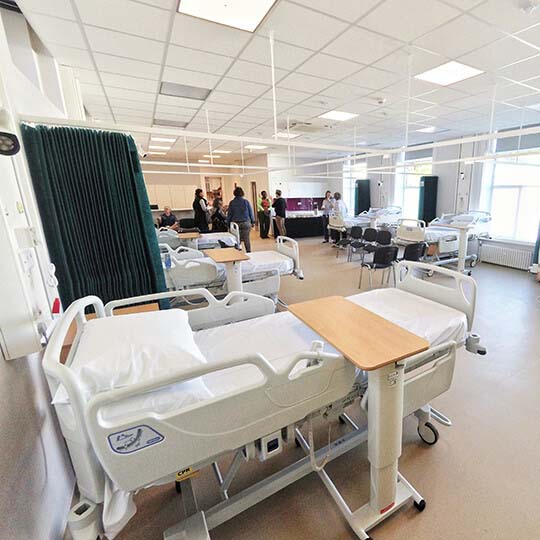
Hands-on learning in world-class facilities
Your training takes place in the modern, purpose built Clinical Simulation Centre at Froebel College, designed to build your confidence and competence in real clinical scenarios. You will practise key skills alongside fellow students, service users, carers, role players and high-tech patient simulators.
The centre includes the Froebel Ward, a fully functional six-bed hospital ward, along with mock consulting rooms, patient homes and a simulated apartment, all equipped with advanced technology and video streaming to support learning and feedback.
You will also use the Mary Seacole Health Innovation Centre at Digby Stuart College, a leading multi-disciplinary hub for primary and community care. These facilities provide a supportive, realistic environment to develop your skills before applying them on real-world placements.
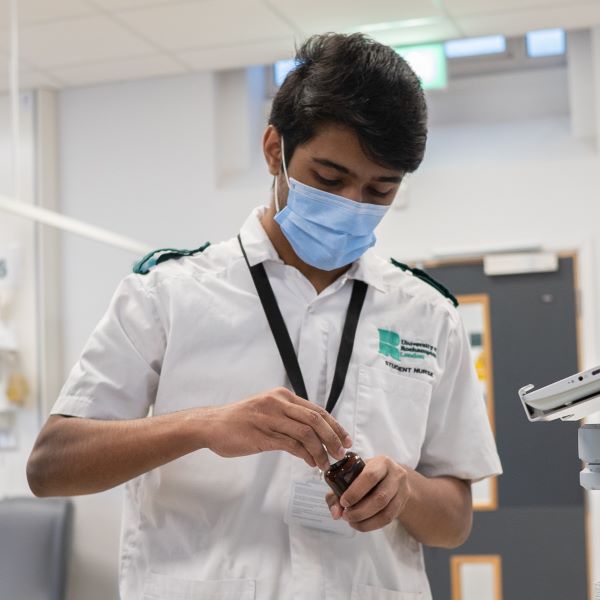
Gain real world skills on placement
Professional placements are a core part of your training, giving you the experience and confidence to step into your first role as a registered nurse.
Our placement network includes:
- St George’s University Hospitals
- Kingston Hospital
- Epsom and St Helier Hospitals
- Croydon Health Services
- Imperial College Hospitals
- London Northwest University Healthcare Hospitals
- North Middlesex University Hospital
- Your Healthcare
- Hounslow and Richmond Community Healthcare
- Sutton Health and Care
- Croydon Health Services
- Surrey Heartlands
Across Sutton, Kingston, Richmond, Croydon, Merton and Wandsworth Training Hubs
- Southwest London and St George’s Mental Health Trust
- The Priory
- Holybourne Hospital
- Blackheath Rehabilitation Centre
- Princess Alice Hospice
- St Raphael’s Hospice
- Trinity Hospice
- Royal Hospital for Neurodisability
- Local care homes
Throughout your course, you will work with a wide range of placement partners, allowing you to develop practical skills in varied clinical environments and understand the full landscape of modern healthcare
You can also arrange an elective placement abroad, giving you the chance to broaden your experience and learn within a different healthcare system.
Open days
Get a real taste of our campus, community and what it’s like to study at Roehampton
Applying
Full-time UK undergraduate students apply through UCAS.
This course is subject to validation.
Entry tariff
112–128 UCAS points (or equivalent)
Looking to work out your UCAS points or find out about our entry requirements? Find out more.
When we consider applications to study with us, we form a complete view of your achievements to date, and future potential, and can offer flexibility in entry requirements. Find out more about our Contextual Offer scheme.
Specific entry requirements
A levels/BTEC (or equivalent qualification): at least one science or health-related subject
GCSE (or equivalent) grades 4/C in Maths and English (at least one science subject desirable).
Applicants will also undertake an interview. Successful applicants will need to complete an Occuaptional Health (OH) Check and an enhanced DBS (Disclosure and Barring Service) Check.
Non-native English speakers who do not have GCSE English or equivalent at grade 4/C or above require an IELTS score of at least 6.5 in writing and at least 7.0 in reading, listening and speaking, with a minimum overall score of 7.0. Please refer to the NMC website for more details.
General entry requirements
International undergraduate students apply through our direct application system.
This course is subject to validation.
Entry tariff
112–128 UCAS points (or equivalent)
Looking to work out your UCAS points or find out about our entry requirements? Find out more.
When we consider applications to study with us, we form a complete view of your achievements to date, and future potential, and can offer flexibility in entry requirements. Find out more about our Contextual Offer scheme.
Specific entry requirements
A levels/BTEC (or equivalent qualification): at least one science or health-related subject
GCSE (or equivalent) grades 4/C in Maths and English (at least one science subject desirable).
Applicants will also undertake an interview. Successful applicants will need to complete an Occuaptional Health (OH) Check and an enhanced DBS (Disclosure and Barring Service) Check.
Non-native English speakers who do not have GCSE English or equivalent at grade 4/C or above require an IELTS score of at least 6.5 in writing and at least 7.0 in reading, listening and speaking, with a minimum overall score of 7.0. Please refer to the NMC website for more details.
General entry requirements
Fees and funding
UK students
Tuition fees
| Entry date | Undergraduate Year 1 |
|---|---|
| September 2026 | £9,790 |
Prices shown are for the first year of your degree.
Funding your studies
We also provide other ways to support the cost of living, including on-campus car parking, hardship support and some of the most affordable student accommodation and catering in London.
International students
Tuition fees
| Entry date | Undergraduate Year 1 |
|---|---|
| September 2026 | £20,280 |
Prices shown are for the first year of your degree.
Funding your studies
We also provide other ways to support the cost of living, including on-campus car parking, hardship support and some of the most affordable student accommodation and catering in London.


